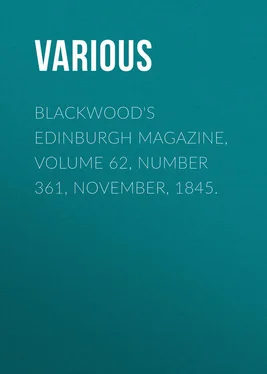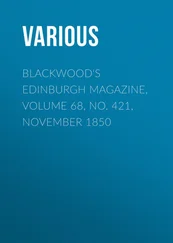Various - Blackwood's Edinburgh Magazine, Volume 62, Number 361, November, 1845.
Здесь есть возможность читать онлайн «Various - Blackwood's Edinburgh Magazine, Volume 62, Number 361, November, 1845.» — ознакомительный отрывок электронной книги совершенно бесплатно, а после прочтения отрывка купить полную версию. В некоторых случаях можно слушать аудио, скачать через торрент в формате fb2 и присутствует краткое содержание. Издательство: Иностранный паблик, Жанр: periodic, foreign_edu, Путешествия и география, на английском языке. Описание произведения, (предисловие) а так же отзывы посетителей доступны на портале библиотеки ЛибКат.
- Название:Blackwood's Edinburgh Magazine, Volume 62, Number 361, November, 1845.
- Автор:
- Издательство:Иностранный паблик
- Жанр:
- Год:неизвестен
- ISBN:нет данных
- Рейтинг книги:3 / 5. Голосов: 1
-
Избранное:Добавить в избранное
- Отзывы:
-
Ваша оценка:
- 60
- 1
- 2
- 3
- 4
- 5
Blackwood's Edinburgh Magazine, Volume 62, Number 361, November, 1845.: краткое содержание, описание и аннотация
Предлагаем к чтению аннотацию, описание, краткое содержание или предисловие (зависит от того, что написал сам автор книги «Blackwood's Edinburgh Magazine, Volume 62, Number 361, November, 1845.»). Если вы не нашли необходимую информацию о книге — напишите в комментариях, мы постараемся отыскать её.
Blackwood's Edinburgh Magazine, Volume 62, Number 361, November, 1845. — читать онлайн ознакомительный отрывок
Ниже представлен текст книги, разбитый по страницам. Система сохранения места последней прочитанной страницы, позволяет с удобством читать онлайн бесплатно книгу «Blackwood's Edinburgh Magazine, Volume 62, Number 361, November, 1845.», без необходимости каждый раз заново искать на чём Вы остановились. Поставьте закладку, и сможете в любой момент перейти на страницу, на которой закончили чтение.
Интервал:
Закладка:
The stranger set spurs to his horse, and galloped down the avenue at the same rapid pace at which he had arrived. The count re-entered the house; and, as soon as he had done so, Luis dropped from his tree, and hurried to rejoin Mariano. In another hour they had returned to the venta.
Luis Herrera was the son of a Castilian gentleman, who had suffered much, both in person and property, for his steady adherence to the constitutional cause in Spain. Severely wounded whilst fighting against the Royalists and their French allies in 1823, Don Manuel Herrera with difficulty escaped to England, taking with him his only son, then a boy of eleven years of age. In 1830 he changed his residence to the south of France, and thence, taking advantage of his proximity to the frontier, and wishing his son's education to be completed in Spain, he dispatched Luis to Madrid, with a recommendation to the Conde de Villabuena, who, notwithstanding that his political principles were diametrically opposed to those of Don Manuel, was one of the oldest friends of the latter. The count welcomed Luis kindly, and received him into his house, where for some months he prosecuted his studies in company with the young Villabuenas, and, at the end of that time, went with them to the university of Salamanca. The vacations were passed by the young men either at the count's house at Madrid, or at a country residence near Tudela, north of which, in the central valleys of his native province of Navarre, the Conde de Villabuena owned extensive estates. The count was a widower, and, besides his two sons, had an only daughter, who, at the time of Luis's arrival was in her sixteenth year, and who added to great personal attractions a share of accomplishment and instruction larger than is usually found even amongst the higher classes of Spanish women. During the first sojourn of Luis at the count's house, he was naturally thrown a great deal into Doña Rita's society, and a reciprocal attachment grew up between them, which, if it occasionally afforded the young Villabuenas a subject of good-humoured raillery, on the other hand was unobserved or uncared for by the count – a stern silent man, whose thoughts and time were engrossed by political intrigues. When Luis went to Salamanca, his attachment to Rita, instead of becoming weakened or obliterated, appeared to acquire strength from absence; and she, on her part, as each vacation approached, unconsciously looked forward with far more eagerness to the return of Herrera than to that of her brothers.
The autumn of 1832 arrived, and the count and his family, including Luis, were assembled at the villa near Tudela. The attachment existing between Rita and Luis had become evident to all who knew them; and even the count himself seemed occasionally, by a quiet glance and grave smile, to recognise and sanction its existence. Nor was there any very obvious or strong reason for disapproval. The family of Herrera was ancient and honourable; and, although Don Manuel's estates had been confiscated when he fled the country, he had previously remitted to England a sum that secured him a moderate independence. The state of things in Spain was daily becoming more favourable to the hopes of political exiles. The declining health of Ferdinand had thrown the reins of government almost entirely into the hands of Queen Christina, who, in order to increase the number of her adherents, and ensure her daughter's succession to the throne, favoured the return to Spain of the Liberal party. Although Don Manuel, who was known to be obstinate and violent in his political views, had not yet been included in the amnesties published, it was thought that he speedily would be so; and then time and importunity, and an adherence to the established order of things, might perhaps procure him the restitution of some part of his confiscated property.
It chanced, that on the fourth day after the arrival of Luis and the Villabuenas from Salamanca, the two latter rode over to the Ebro, below Tudela, for the purpose of bathing. They were not good swimmers, and were moreover unaccustomed to bathe in so rapid and powerful a stream. A peasant, who observed two horses tied to a tree, and some clothes upon the grass by the river side, but who could see nothing of the owners, suspected an accident, and gave the alarm. A search was instituted, and the dead bodies of the unfortunate young men were found upon the sandy shore of an island some distance down the river.
This melancholy event was destined to have an important influence on the position of Luis Herrera in the family of Count Villabuena, and on his future fortunes. Mingled with the natural grief felt by the count at the untimely death of his children, were the pangs of disappointed pride and ambition. He had reckoned upon the gallant and promising young men, thus prematurely snatched away, for the continuance and aggrandizement of his ancient name. Upon his daughter he had hitherto scarcely bestowed a thought. She would marry – honourably of course, richly if possible; but even in this last respect he would not be inflexible, for where his pride of birth did not interfere, Villabuena was not an unkind father. But the death of his sons brought about great changes. The next heir to his title and estates was a distant and unmarried cousin, and to him the count determined to marry his daughter, whose beauty and large fortune in money and unentailed estates, rendered any objection to the match on the part of her kinsman a most improbable occurrence. As a first step towards the accomplishment of this scheme, the count resolved to put an end at once to what he considered the childish attachment existing between Rita and Luis. Within a week after the death of his sons, he had a conversation with young Herrera, in which he informed him of his intentions with regard to his daughter, and pointed out to him the necessity of forgetting her. In vain did Luis declare this to be impossible, and plead the strength which his attachment had acquired by his long permitted intercourse with Rita. The count cared little for such lover-like arguments; he assured Luis that he was mistaken, that time and absence brought oblivion in their train, and that after a few months, perhaps weeks, of separation, he would wonder at the change in his sentiments, and laugh at the importance he had attached to a mere boyish fancy. It so happened, that on the day preceding the one upon which this conversation took place, a letter had been received from Don Manuel Herrera, announcing his speedy return to Spain, the much-desired permission having at length been obtained. In order to give Luis an opportunity of speedily testing the effects of absence, the count proposed that he should at once set out for the French frontier to meet his father. Under the existing circumstances, he said, it was undesirable that he should remain under the same roof with his daughter longer than could be avoided.
Although bitterly deploring the prospect of an immediate and lasting separation from Rita, Luis had no choice but to adopt the course proposed; nor would his pride have allowed him to remain in the count's house an instant longer than his presence there was acceptable. He feared that the count would prevent his having a last interview with Rita; but this Villabuena did not think it worth while to do, contenting himself with repeating to his daughter the communication he had already made to Luis. When the latter sought his mistress, he found her in tears and great affliction. The blow was so sudden and unexpected, that she could scarcely believe in its reality, and still less could she bring herself to think that the count would persist in his cruel resolution. "He will surely relent," she said, "when he sees how unhappy his decision makes me; but should he not do so, rest assured, Luis, that I will never be forced into this odious marriage. Sooner than submit to it, a convent shall receive me." And once more repeating the vows of constancy which they had so often interchanged, the lovers separated. At daybreak upon the following morning, Luis set out for Bayonne.
Читать дальшеИнтервал:
Закладка:
Похожие книги на «Blackwood's Edinburgh Magazine, Volume 62, Number 361, November, 1845.»
Представляем Вашему вниманию похожие книги на «Blackwood's Edinburgh Magazine, Volume 62, Number 361, November, 1845.» списком для выбора. Мы отобрали схожую по названию и смыслу литературу в надежде предоставить читателям больше вариантов отыскать новые, интересные, ещё непрочитанные произведения.
Обсуждение, отзывы о книге «Blackwood's Edinburgh Magazine, Volume 62, Number 361, November, 1845.» и просто собственные мнения читателей. Оставьте ваши комментарии, напишите, что Вы думаете о произведении, его смысле или главных героях. Укажите что конкретно понравилось, а что нет, и почему Вы так считаете.












